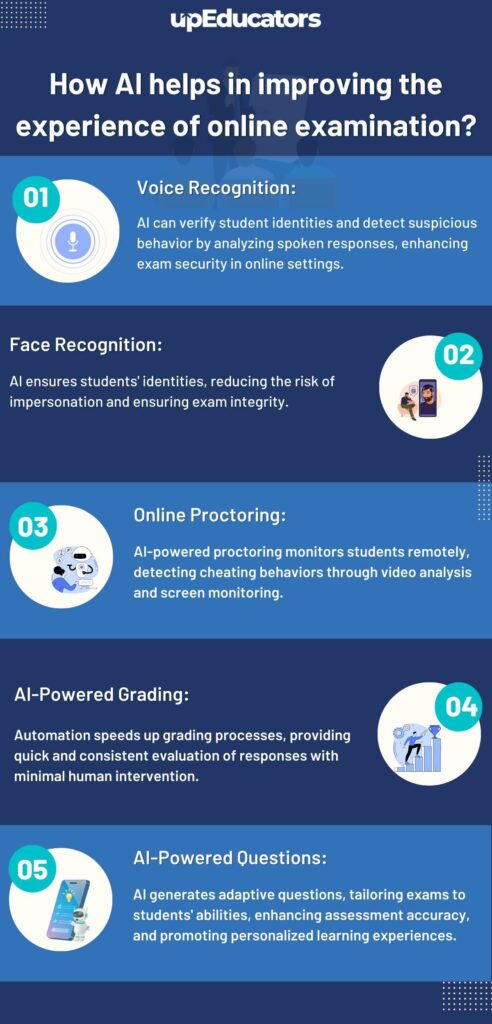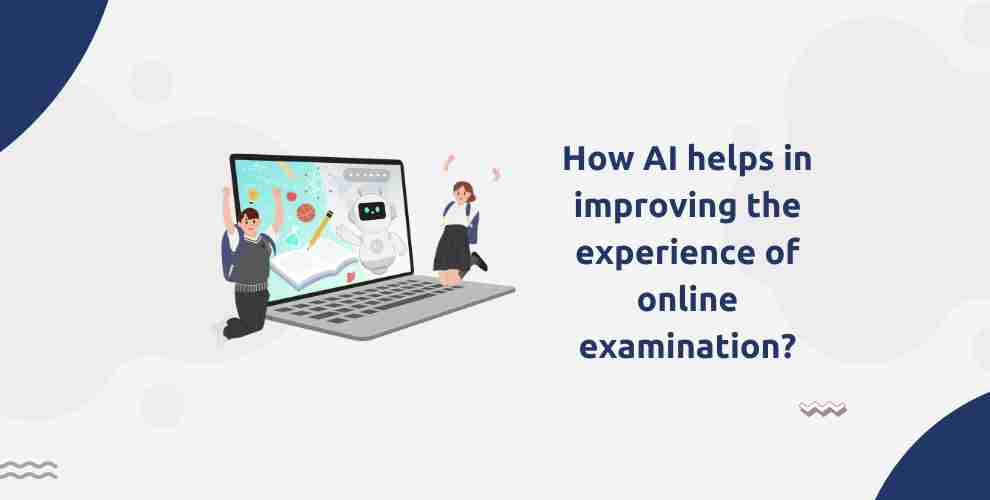During the pandemic, many educational institutions had to shift to online exams, which created a need for effective proctoring solutions to maintain academic integrity. AI-powered proctoring tools provided a solution to this problem by automating the monitoring process and flagging any suspicious behaviour.

Teachers and institutes face many problems while conducting online examinations. And AI helps in facing and solving these issues. We will look at some ways in which AI helps in conducting online examinations. But before that, let us look at the problems that teachers face while conducting online examinations.
Problems Teachers face during online examinations
Online examinations have become an increasingly common way of assessing students’ knowledge and understanding, especially during the COVID-19 pandemic. However, conducting online examinations can present some challenges for teachers, which can make the process more difficult and stressful. Here are some of the problems faced by teachers during online examinations:
- Technical issues: Technical glitches such as internet connectivity issues, power outages, or problems with the online examination platform can disrupt the exam and cause delays or confusion.
- Maplractice: It can be difficult to monitor students during online exams, which increases the risk of malpractice. Students may collaborate with each other or use external resources to complete the exam.
- Communication difficulties: It can be challenging to communicate with students during online exams, especially if they have questions or technical issues that need to be addressed.
- Time management: Time management can be a problem during online exams, as teachers need to ensure that students have enough time to complete the exam while also adhering to strict deadlines.
- Assessment: Evaluating and grading student’s work can be more time-consuming during online exams, as teachers need to review and assess each student’s responses individually.
How can AI help?
AI can be very helpful in conducting online examinations. AI technology can automate many of the tasks that teachers traditionally perform during exams, such as grading and monitoring for cheating. Here are some ways AI can be useful in conducting online examinations:
Voice Recognition
Voice recognition is a powerful feature of AI that can be very helpful in conducting online examinations. Here are some ways voice recognition can be used in online exams:
- Authentication: Voice recognition can be used to authenticate the identity of students taking the exam. This can help prevent cheating by ensuring that the person taking the exam is actually the registered student.
- Speech-to-text: Voice recognition can convert spoken responses into text, making it easier to assess essay or short answer questions. This can save time for teachers and help ensure consistency and objectivity in grading.
Face Recognition
Face recognition is another feature of AI that can be very helpful in conducting online examinations. Here are some ways face recognition can be used in online exams:
- Authentication: Face recognition can be used to authenticate the identity of students taking the exam. This can help prevent cheating by ensuring that the person taking the exam is actually the registered student.
- Monitoring: Face recognition can monitor students during the exam to ensure that they are not using external resources or collaborating with others. This can help maintain the integrity of the exam and ensure fairness for all students.
- Time management: Face recognition can be used to track the amount of time that students spend on each question or section of the exam, helping to ensure that they complete the exam within the allotted time.
Online Proctoring
AI can be very helpful in proctoring during online exams. Here are some ways that AI can assist in proctoring:
- Eye-tracking: AI can use eye-tracking technology to monitor the movement of a student’s eyes during the exam. This can help detect if a student is looking away from the screen or looking at another device, which can indicate cheating.
- Keystroke analysis: AI can analyse a student’s keystrokes during the exam to detect if they are typing too quickly or using copy and paste. This can help detect instances of plagiarism and cheating.
- Audio analysis: AI can analyze audio during the exam to detect if a student is speaking to someone else or using external resources. This can help detect instances of cheating.
- Proctoring software: AI can be integrated into proctoring software, allowing proctors to monitor multiple exams at once and flag any suspicious behaviour. This can help proctors more effectively monitor exams and detect instances of cheating.
AI-powered grading
AI-powered grading can potentially improve the efficiency and accuracy of grading for online exams. With the increase in the number of online exams being conducted, AI-powered grading can be an effective tool to help educators manage and grade a large number of exams.
- AI-powered grading can automatically grade objective questions, such as multiple-choice, true-false, and matching questions, which are commonly used in online exams. This can save time for educators and allow them to focus on evaluating subjective questions that require human judgment.
- AI-powered grading can also help reduce the potential for bias in grading by providing a consistent and objective evaluation of student responses. This can help ensure that all students are graded fairly and equitably.
AI-powered questions
AI-powered questions can be a helpful tool in conducting online exams. These types of questions use artificial intelligence to generate questions and responses based on specific parameters and criteria, which can make them more efficient and effective for online exams.
- One benefit of AI-powered questions is that they can be customized to fit the specific learning objectives and goals of the exam. AI algorithms can analyze data about student performance and create questions that are tailored to the individual student’s level of understanding and learning progress. This can help ensure that students are being challenged appropriately and that the exam is effective in assessing their knowledge and skills.
- AI-powered questions can also be designed to adapt to the student’s performance in real time. If a student answers a question correctly, the next question can be more challenging, while if a student struggles with a question, the next one can be easier. This can help create a more personalized learning experience and ensure that each student is tested at their own level.
AI has the potential to greatly improve the experience of online examinations for both students and educators. With the increasing demand for online learning and exams, AI-powered tools such as grading and question generation can help streamline the exam process, making it more efficient and effective. These tools can also help personalize the learning experience for each student, ensuring that they are tested at their own level and pace. While there are still challenges and limitations to be addressed, AI-powered technologies offer a promising future for online education and examinations and are likely to become an integral part of the learning process in the years to come.
Author: This article is written by Samiya Rashid for upEducators blog.




